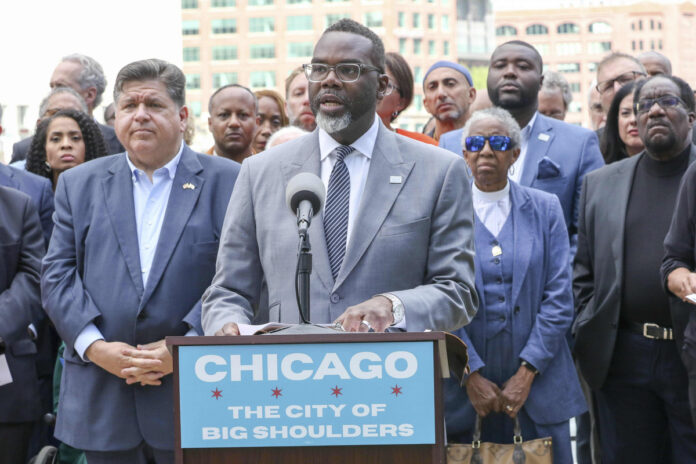Chicago has long been a city of immigrants, and under Mayor Brandon Johnson, it is once again at the forefront of resistance against federal immigration enforcement policies. As the federal government intensifies its actions, Johnson has unveiled a series of initiatives designed to protect immigrant communities, expand access to legal resources, and reinforce Chicago’s sanctuary city status. These moves not only deepen the city’s legacy of immigrant protection but also spotlight the widening political divide between urban centers and federal authorities.
Strengthening Sanctuary City Policies
Mayor Johnson’s administration has expanded on policies established by his predecessors, but with a more proactive edge. The city has rolled out new digital reporting tools that allow immigrants to report potential violations of their rights while protecting their anonymity. In addition, city-funded hotlines and mobile applications now connect residents directly to legal aid groups within minutes.
The Johnson administration also increased funding for community organizations that provide legal support to undocumented residents. According to city budget records, funding for immigrant legal aid in Chicago has risen by 30% since 2023, ensuring more attorneys are available to assist with deportation defense and asylum applications.
Community Voices: A Grassroots Push
Local leaders have played a pivotal role in shaping the city’s immigration stance.
- Maria Gutierrez, director of the Chicago Immigrant Justice Network, praised Johnson’s initiatives: “For too long, immigrant families lived in fear of sudden raids. These tools give them a sense of security and a voice in the system.”
- Reverend James Carter, a South Side pastor who works closely with immigrant congregations, emphasized the moral dimension: “Chicago isn’t just passing policies—it’s telling families, ‘You belong here.’ That message matters in times like these.”
These testimonials highlight how the city’s policies resonate beyond politics, becoming part of Chicago’s identity as a city of refuge.
Legal Aid Expansion and Data Insights
The city’s Department of Family and Support Services released new figures showing a 15% increase in immigrants accessing legal aid over the past year. Much of this growth stems from expanded outreach campaigns, which include multilingual workshops in neighborhoods such as Pilsen, Little Village, and Albany Park—areas with high immigrant populations.
The administration also partnered with local universities to track the impact of these programs. Early findings show that immigrants with access to city-supported legal aid are twice as likely to avoid deportation proceedings compared to those without such assistance.
Federal Tensions: A Clash of Agendas
Chicago’s defiance puts it squarely at odds with federal immigration enforcement efforts. Federal officials argue that sanctuary cities undermine national immigration laws, while Johnson frames his policies as a defense of human rights and constitutional protections.
At a recent press conference, Johnson stated: “We will not allow Chicago families to live in constant fear. Immigration is about people, not politics. And as mayor, I will ensure this city stands on the right side of history.”
This positioning has sparked criticism from some state lawmakers and law enforcement groups, who claim the policies create legal loopholes. Yet in Chicago, Johnson’s measures have galvanized support among immigrant communities and progressive activists, reinforcing his broader agenda of social justice.
A Symbol of Urban-Rural Divide
Chicago’s stance highlights a broader national trend: large urban centers increasingly adopting progressive immigration policies in contrast to more restrictive federal and rural state approaches. This urban-rural divide is not just political but cultural, illustrating different visions of America’s identity.
Political analyst Carla Mendoza explained, “Chicago’s response to federal immigration pressure isn’t just about protecting immigrants—it’s a declaration of values. It shows how cities are becoming the moral counterweight to federal power.”
Why It’s Trending
- Human-Centered Narrative – Grounded in stories of immigrant families, legal aid workers, and local leaders.
- Political Flashpoint – Embeds Chicago’s actions in the larger national conflict over immigration.
- Regional Significance – Highlights how policies affect specific neighborhoods and communities.
Final Thought
Mayor Brandon Johnson’s stand against federal immigration policies places Chicago in the spotlight as both a sanctuary and a symbol of resistance. By combining digital tools, expanded legal aid, and grassroots partnerships, the city is setting a precedent for urban immigration policy in the 21st century.
Chicago’s story is more than a clash of politics—it’s about dignity, belonging, and the enduring belief that the city’s strength lies in its diversity.




